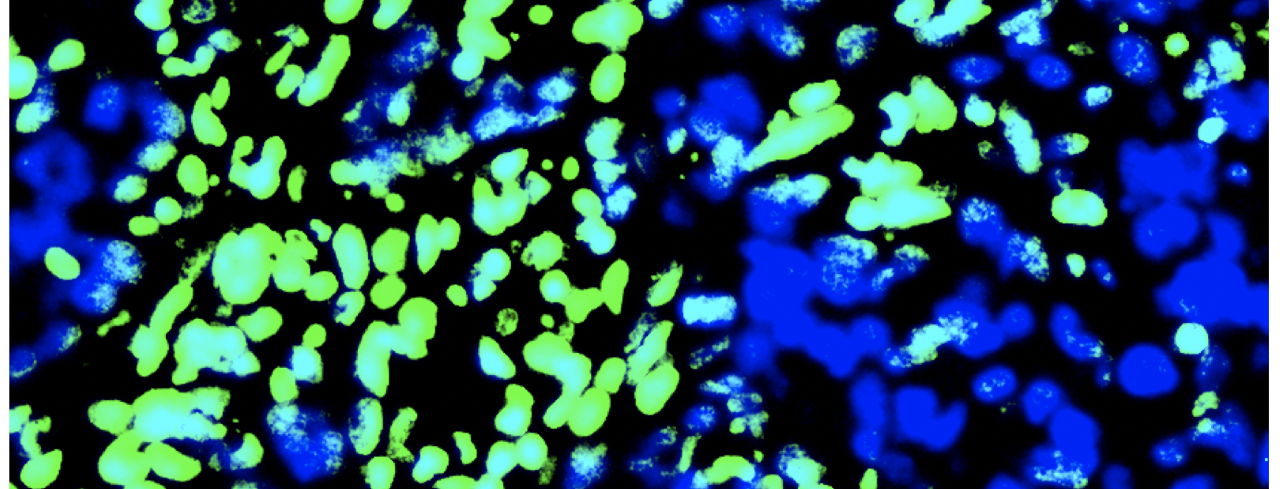Targeting acidity: a new approach to tackle pancreatic cancer
Inhibiting the bicarbonate transporter SLC4A4 in pancreatic cancer cells promotes an immune reaction and supports immunotherapy effectiveness.
A type of pancreatic cancer known as pancreatic adenocarcinoma (PDAC) is one of the most aggressive and lethal cancers. So far, immunotherapy treatment doesn’t work. Research by the team of Prof. Massimiliano Mazzone (VIB-KU Leuven Center for Cancer Biology), KU Leuven, University Hospital Leuven, and international colleagues identified a new therapeutic target that overcomes immunosuppression and immunotherapy resistance in pancreatic cancer by changing the acidity of the tumor micro-environment. Their work appears in Nature Cancer.
In short:
- Pancreatic cancer has the highest mortality rate of all major cancers. For all stages combined, the 5-year relative survival rate is 11%.
- Pancreatic adenocarcinoma (PDAC) accounts for over 90% of pancreatic cancers.
- PDAC tumors show a strong decrease in the pH of the fluid between cells – they exist in a more acidic environment compared to normal tissues.
- Targeting the bicarbonate transporter SLC4A4 increases the pH (= less acidic) of the tumor environment, which supports anti-tumor immunity and grants efficacy to immunotherapy.
Acid environments help tumors escape immune surveillance
Tumors usually lower the pH in their environment due to their fast metabolism. The result is an acidic tumor microenvironment. This is especially the case in pancreatic adenocarcinoma (PDAC), one of the most aggressive and lethal cancer types. So far, conventional therapies and immunotherapy have provided little relief for PDAC patients. The acidic tumor microenvironment could be to blame for this. It suppresses the body's own immune reaction and reduces the effectiveness of immunotherapy.
Prof. Mazzone (VIB-KU Leuven Center for Cancer Biology): "Because of the role pH plays in immune response, we decided to take a closer at bicarbonate transporters – which help to regulate pH in the body – in the progression and control of the immune response in PDAC. In particular, by analyzing datasets of PDAC patients, we focused on the most expressed transporter in pancreatic cells, called SLC4A4."
Left: identification of slc4a4 in ductal cells from pancreatic cancer patients; right: transcriptomic analysis allows target discovery in PDAC patients.
Turning down acidity
In both cell cultures and mouse models, the team of Prof. Massimiliano Mazzone (VIB-KU Leuven Center for Cancer Biology), KU Leuven, UCL Louvain, University Hospital Leuven, and international colleagues show that blocking SLC4A4 on cancer cells improves the immune response and boosts immunotherapy. Normally, this transporter allows the tumor cells to take up bicarbonate from the environment. This lowers the environmental pH and makes it more acidic. By blocking the transporter, the bicarbonate stays in the environment, which becomes less acidic as a result. A less acidic tumor microenvironment is more hospitable to immune cells that can target the tumor.
Federica Cappellesso, first author of the study: "When we inhibited SLC4A4 in mice bearing PDAC tumors, we saw improvements in the immune reaction that prevented tumor growth and metastasis. We also found a better response to immunotherapy. SLC4A4 appears to be a great therapeutic target to release an anti-tumor immune response in pancreatic cancer."

From scientific discovery to therapy development
Inspired by the preclinical findings on the role of SCL4A4 in PDAC, VIB Discovery Sciences (VDS) joined forces with the team of Prof. Mazzone to discover and characterize biologic drug candidates that can selectively inhibit SLC4A4. Promising results in cell cultures and mouse models encouraged the team to progress this project into early drug development. There are still several steps to take before arriving at a drug for human patients, but the team is hopeful and motivated.
The VDS unit is a translational research team of scientists and technicians with a strong background in the biotechnology industry. They help validate the scientific breakthroughs made by VIB scientists and focus on the translation of early research into therapeutic and diagnostic products for application in the medical and agricultural fields.
Publication
Targeting the bicarbonate transporter SLC4A4 overcomes immunosuppression and immunotherapy resistance in pancreatic cancer. Cappellesso et al. Nature Cancer, 2022.
Questions from patients
A breakthrough in research is not the same as a breakthrough in medicine. The realizations of VIB researchers can form the basis of new therapies, but the development path still takes years. This can raise a lot of questions. That is why we ask you to please refer questions in your report or article to the email address that VIB makes available for this purpose: patienteninfo@vib.be. Everyone can submit questions concerning this and other medically-oriented research directly to VIB via this address.
About the VIB-KU Leuven Center for Cancer Biology
Cancer has many causes. Often it is a combination of lifestyle, environmental factors, and genetic variation. We need to fight cancer on many fronts, and this can only be done by using knowledge. The researchers of the VIB-KU Leuven Center for Cancer Biology unravel new mechanisms to develop both specific diagnostic methods and treatments.
Gunnar De Winter

.png)



